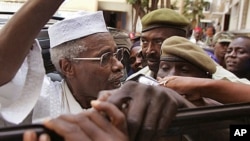The United Nations is asking Senegal to reconsider its decision to send home former Chadian dictator Hissene Habre, who has already been sentenced to death in Chad for the torture and killing of political opponents. Senegal says it will extradite Habre on Monday.
U.N. High Commissioner for Human Rights Navi Pillay is urging Senegal's government to review its decision to extradite the former Chadian leader, who has lived in Dakar since he was driven from power more than 20 years ago.
In a written statement, Pillay says that Senegal, as a party to the Convention Against Torture, may not extradite anyone to a state “where there are substantial grounds for believing he would be in danger of being subjected to torture.”
Pillay says Senegal, at the very least, must obtain fair trial guarantees from the Chadian government. She says sending Habre home without those guarantees “may amount to a violation of international law.”
A 1992 truth commission in Chad found Habre responsible for widespread torture and the deaths of at least 40,000 people. Senegal put him under house arrest in 2005 when he was charged by the Belgian government for crimes against humanity based on cases brought by Chadians living in Belgium.
In 2008, Chad tried him in absentia and sentenced him to death for planning to overthrow the Chadian government.
Senegal's announcement Friday that Habre would be extradited on a charter flight Monday moves to end years of legal wrangling about what to do with the former Chadian leader. Senegal originally said it had no jurisdiction to try him, then changed its laws to include crimes against humanity. President Abdoulaye Wade's government then wanted the international community to pay the cost of the trial up front.
The African Union has said if Senegal cannot afford to try Habre itself, he should be extradited to Belgium or sent back to Chad if the death sentence against him there is lifted and he can be assured of a fair trial.
Habre lawyer El Hadj Diouf says President Wade's decision to extradite the former Chadian leader is meant to destroy him.
Diouf says the decision amounts to kidnapping Hissene Habre and taking him hostage to sell to Chadian ruler Idriss Deby. Diouf says his client will be immediately executed in N'Djamena. He says Senegal's extradition decision has no legal standing.
Human rights groups have also expressed concern about the move. Alioune Tine is president of the African Human Rights Organization and has worked with many survivors of Habre's rule who now live in Senegal.
Tine says U.N. Secretary-General Ban Ki-Moon should ask President Wade to reverse his decision because it contravenes the international convention against torture. Tine says you cannot send someone to a country that practices torture and uses the death penalty.
Amnesty International says Senegal has avoided putting Habre on trial for years, despite its international obligations to do so. The group says sending him back to Chad now, where he faces the death penalty and an unfair trial, brings no real justice to the thousands who suffered human rights violations during his eight-year rule.
UN Asks Senegal to Reconsider Repatriating Former Chadian Leader Habre




